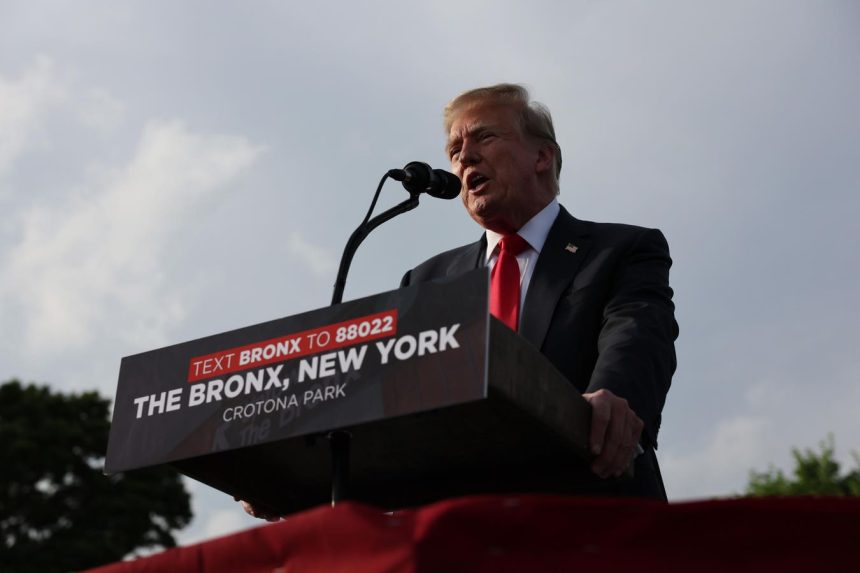As the presidential campaign heats up, Donald Trump is recycling a standby of his previous campaigns—attacking American cities as crime-ridden and immigrant-flooded danger zones that must be controlled to keep people safe. Whether this polarizing vision succeeds with suburban voters (the real targets of his rhetoric) will be an important factor in who wins the election.
Trump’s attacks were on full display in a recent campaign event in the Bronx, a New York City borough that President Biden won in 2020 by 68 percent. Only 8 percent of Bronx residents are white, making it an unlikely hunting ground for Trump voters. (Trump went to the Bronx in part because he has to be in New York while on trial in his hush-money criminal case.)
Trump claimed immigrants are hurting “our Black population and our Hispanic population, who are losing their jobs, losing their housing, losing everything they can lose.” He also said immigrants are “building an army” that would attack America “from within,” and that as president, he would carry out mass deportations.
This extreme rhetoric isn’t new for Trump. In the last election campaign, Trump argued that Biden’s modest fair housing plans meant the “suburbs would be gone,” and urban crime would “easily spread,” threatening “suburban women.” He’s called Baltimore a “rodent-infested mess,” said Chicago and other cities were suffering a “rampage of violence,” and recently claimed Washington D.C. is a “dirty, crime-ridden death trap.”
Fear of crime is a powerful issue for Trump and Republicans, even while crime has fallen over the past decades. In many polls of the electorate, crime is a top issue after the economy and inflation. Concern about crime is rising among voters, “even though the violent crime rate fell 49% between 1993 and 2022,”with property crime falling 59 percent in those years.
Trump’s anti-crime and anti-immigrant rhetoric are the most provocative parts of a more general Republican attack on cities, which are Democratic electoral strongholds, even in red states. And conservative policy planners now are detailing how a second Trump administration can go after cities.
The first Trump administration did little policy planning before his surprise victory. But in sharp contrast, right-wing think tanks now are working hard on how to implement policies if Trump wins in November.
The Heritage Foundation, a very conservative think tank, is coordinating Project 2025, an effort they describe as necessary to “rescue the country from the grip of the radical Left.” The project is developing policy proposals meant to be implemented immediately upon Trump’s inauguration.
Heritage already has released an almost 900 page document, “Mandate for Leadership: The Conservative Promise.” It proposes plans across the full range of federal government powers, from defense to health care to reproductive rights to environmental regulation to prosecutions by the Justice Department.
For cities, proposals range from withholding federal grants for law enforcement, health and housing support for immigrants, eliminating fair housing regulations for suburbs, and sharply reducing emergency disaster and other spending from the Federal Emergency Management Agency (FEMA) while refusing spending unless cities allow federal agencies to override their own law enforcement policies.
These proposals could support Trump’s plans to deport millions of immigrants using the National Guard and possibly the U.S. Army. Deportations at that scale would have to override law and legal due process, and would include many workers essential to the American economy. In low-wage sectors like home health care, restaurants and food delivery, hotels and hospitality, and agriculture, this could create major labor shortages, in addition to its humanitarian impacts.
Attacking cities, and encouraging hostility between them and their surrounding suburbs, is bad policy generally. But it is especially misguided because cities are the drivers of our economic prosperity. Their suburbs—and the entire American economy—only prosper when cities do.
The Brookings Institution’s Metro Monitor documents that America’s 194 metropolitan areas with over 250,000 population “together account for 78% of U.S. population and 84% of U.S. GDP.” Metro areas, with cities at their center, are America’s hubs of innovation, trade, and production.
As I document in my 2023 book Unequal Cities (Columbia University Press), our metro economies have a deep structural problem. While each metro area has one interdependent economy, our encouragement of and subsidies for legally independent suburbs has created misaligned, fragmented, and racially segregated political economies across the country.
For our prosperity and growth, America needs cooperation—not confrontation and division—in our metro areas. Trump’s anti-city rhetoric may help him politically, especially if it frightens suburban voters. But his anti-city policies would hurt us economically, worsening America’s problems with jobs, wages, and economic growth and security.
Read the full article here
















